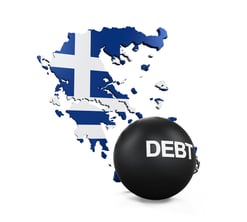 For the last four years, whenever a news report emanates from Greece, it has been suggested as an excuse for the stock market advancing or declining. This quixotic response has caused undo nervousness as the latest Greek drama unfolds here in the middle of 2015. It is certainly possible they will agree to kick the debt problem further down the road or slip into default by not paying their debts, either way the impact to your portfolio will likely be negligible.
For the last four years, whenever a news report emanates from Greece, it has been suggested as an excuse for the stock market advancing or declining. This quixotic response has caused undo nervousness as the latest Greek drama unfolds here in the middle of 2015. It is certainly possible they will agree to kick the debt problem further down the road or slip into default by not paying their debts, either way the impact to your portfolio will likely be negligible.
Greece put themselves into this position via a series of missteps over the years. The primary culprit is the politicians who essentially gave away richer and richer pension schemes vying for public favor. Before 2010, a civil servant could retire at the age of 58 and continue to earn 80% of their final salary. Over 29% of the labor force was employed by the government of Greece. Political bribing through pensions was extended to employees of Olympic Airlines, farmers, employees at the National Bank of Greece and even hairdressers. Another endemic problem is the high level of tax evasion described as “a national sport” by Greece politicians; an estimated $30 billion goes uncollected annually. Considering the country may tip into default for failure to make a $1.7 billion payment on June 30th, this is a significant problem.
In a 2012 study of Greek citizens, 90% of surveyed households believed the political parties were “corrupt” or “extremely corrupt” (the difference?). The citizenry has brought the problems on themselves. In the last national election in January, upset by the austerity measures invoked by their European neighbors in order to receive more loans, the citizens of Greece elected Finance Minister Yanis Varoufakis while he was living in San Antonio, Texas. He promised that he would never let pensions be cut. Prime Minister Alexis Tsipras was even more unrealistic, pledging to write off most of the public debt, end the austerity measures and rehire all government workers who lost their job. So they know their government is corrupt, and then elect candidates that tell them what they want to hear.
While The Iliad was a Greek tragedy written by Homer, this real life Odyssey is not going away for Greek citizens. It will be a painfully long problem that will only be rectified by taking steps any Economics 101 student learns as a freshman. Greece has piled up a mountain of debt by spending beyond its means. A common theme among Carnegie clients is the aversion of debt which is why they are successful citizens and have funds to manage. Until there is an adult in the room negotiating on behalf of the citizens of Greece, the problems will continue to mount.
Fortunately the Greek crisis alone is unlikely to have any real impact on your portfolios, despite the media attention. First, the GDP of Greece is small, less than ½ of 1% of the world’s GDP and smaller than the GDP of the state of Indiana, who has 2/3rds the number of citizens. Second, we own no direct securities of stocks or bonds from Greece. Third, while a bankruptcy is never a good thing, the debt owed is not owned by U.S. banks or institutions in which we have invested. In 2010, most of the Greek debt was owned globally by international banks or mutual funds. In 2011, European banks agreed to take up to a 50% haircut on past loans in order to extend further credit to Greece. When those loans could not be paid, the country received the first of two international bailouts from the troika of the European Central Bank, the International Monetary Fund and the European Commission. Therefore, most of the money Greece owes is to these three government entities who can handle taking a $270 billion loss. If the debt were owed to American or European banks, the fallout would be long and wide; that is simply not the case today.
Greece is already in a recession with an economy that has slid over 23% since 2009. The unemployment in Greece is at 26% and rising. A Greek default will cause a run on Greek banks and further slippage of the economic strength of Europe. This is a known known however, and any word from Greece will likely be negative and is priced into the market. Whether Greece stays in the European Union or accepts concessions will prove to be interesting drama, however it will have only a minor impact in the international markets after a short period. Greece is the Kardashians of the economic press, not a word you need to pay attention to this summer.
Ready for more?
Over ONE TRILLION DOLLARS is managed by the top ten bond mutual funds, according to Forbes. This vast pool of assets controlled by a few players affects the whole asset class. In our whitepaper, we discuss this and other risk factors that have contributed to "Bondmageddon," a scenario investors face today. We also outline the five critical strategic considerations we make when constructing a bond portfolio.


